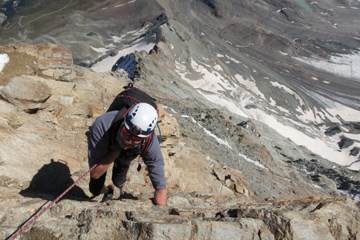Walking without a leg to stand on

Quadruple amputee Jamie Andrew gained his Mountain Leader award after losing both hands and feet. Nicola Jasieniecka caught up with him to discuss climbing the Matterhorn, mountaineering for people with disabilities and his involvement with the GB Paraclimbing team.
What’s your earliest memory of being in ‘the outdoors’? Have you always loved it?
My parents took me hill walking, in Scotland and the Lake District, from a young age. I hated it! But as I grew older I really began to appreciate the sense of freedom of being in the outdoors and the immense beauty of Britain’s wild places. From then I embraced the challenge of mountaineering and have never looked back.
When and why did you want to become a Mountain Leader? Did you find the scheme accessible and is there anything Mountain Training can do to make it more so?
After losing my hands and feet, becoming a Mountain Leader seemed out of the question. But over the years I have trained myself to always question limiting self-beliefs and so a few years ago I decided to give it a go. Everyone involved in my training and assessment was extremely open and helpful in finding ways to overcome the obstacles I faced. Protection on steep ground using a rope was one of the areas I found challenging and I was able to work closely with Steve Long and Alan Fyffe in particular, to adapt the techniques I could employ. We agreed that it’d be fine for me to carry a Gri Gri instead of doing a waist belay, for example. To be honest, during assessment, the navigation was definitely the hardest thing, and that was the case for everyone in the group.
Is it something you would recommend to other people with disabilities?
Definitely. Even if you’re not certain you want to become a Mountain Leader, doing the course is an excellent way to build confidence and develop your own personal skill in the hills.
Do you have any plans to do any other Mountain Training awards?
Possibilities from here would be Winter ML, International ML, or SPA. All would be a huge challenge for me and something to think about for the future!
Have you encountered any prejudice while developing your skills as a walker, climber or mountaineer since your accident?
Generally I find that if I approach any situation with an open mind and a positive attitude, people will reward me with the same attitude. Everyone wants to help others!
Are you optimistic about the future for disabled people in mountaineering?
The world is changing fast and attitudes to disability with it. I believe that the mountains are there for everyone and thankfully I am not alone in that belief.
Do you have any goals for your future in the mountains? When/where will your next adventure be?
For the past couple of years I have been planning to climb The Matterhorn in a bid to become the most disabled person ever to do so. Last summer I got to within 250m of the top before lack of time forced a descent. So hopefully I’ll be back for another crack at that before too long.
Jamie's adventure on the Matterhorn has been made into a documentary by Channel 5.What’s the one thing you’d never go on the hill without?
My prosthetics. Without them I wouldn’t have a leg to stand on!
Hot off the press: you’ve recently taken on a supporting role with the GB Paraclimbing team?
Yeh, I’m keen to be involved because it’s only just starting out. We have a team with some really diverse backgrounds so I’m looking forward to getting to know them. I wish I was younger so I could get more involved. It’s great to be a part of something that promotes the fact that climbing is for everybody.